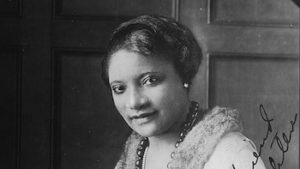
A'Lelia Walker
On this date, A'Lelia Walker was born in 1885. She was a Black businesswoman who was associated with the Harlem Renaissance as an arts patron who provided an intellectual forum for the New York City Black literati during the 1920s.
Walker was born Lelia McWilliams Robinson Wilson Kennedy in Vicksburg, Mississippi, grew up in St. Louis, Missouri, and attended Knoxville College in Tennessee before working for her mother, Madame C. J. Walker (Sarah Breedlove Walker), who had made a fortune in the hair-care business. She managed the Pittsburgh, PA, branch of her mother's hair-care product empire (c. 1908-14); oversaw Lelia College, a school of cosmetology also run by the company; became manager of the Walker College of Hair Culture, New York City, in 1914; and became president of the company, 1919.
When her mother died in 1919, Walker inherited the business and the lavish family estate, Villa Lewaro, in Irvington, New York. In the 1920s, she entertained writers and artists at Villa Lewaro, her apartment, and her townhouse in New York City. Her regular guests at the townhouse--which she named “The Dark Tower” after Countee Cullen's column by that name--included Langston Hughes, Zora Neale Hurston, James Weldon Johnson, Jean Toomer, and other writers associated with the Harlem Renaissance. In some ways, The Dark Tower served to reinforce the prejudice some in the Black community had against Walker; she was sometimes seen as more interested in presenting authentic "Negro" culture for the benefit of her white acquaintances than actually promoting it with financial support.
On one occasion, in what would become an apocryphal tale of the Harlem Renaissance, Walker separated her guests by color and served whites chitterlings and bathtub gin while Blacks enjoyed champagne and caviar. Some among Harlem's upper stratosphere even snubbed her for being the daughter of a washerwoman, despite her mother being the country's first Black female self-made millionaire. Privately, elitist, lighter-skinned Blacks dismissed Walker as "the Mahogany Millionaires." Walker was also quite tolerant of gays in her social set, which set her at odds with some of Harlem's more conservative hierarchy. Grace Nail Johnson, the wife of novelist James Weldon Johnson and considered the grand dame of Harlem society, remained adamant about never crossing the threshold of Walker's residences or The Dark Tower.
As the decade waned, Walker continued to entertain lavishly, though years of excessive indulgence in both food and alcohol were taking their toll on her six-foot frame. The parties ended, however, with the onset of the Great Depression in 1929. The Madam C. J. Walker & Company, with its massive Indianapolis plant and national distribution network, began to feel the impact of the economic misfortune early on. The heiress shuttered The Dark Tower in 1930 and the following year auctioned off some of the antiques and luxuries housed at Villa Lewaro; she also divorced Kennedy.
On August 16, 1931, the New York Times announced that Walker had died in the early morning hours of that same day. Walker had been hosting a birthday party for a friend at a house in Long Branch, New Jersey.
The African American Atlas
Black History & Culture an Illustrated Reference
by Molefi K. Asanta and Mark T. Mattson
Macmillan USA, Simon & Schuster, New York
ISBN 0-02-864984-2